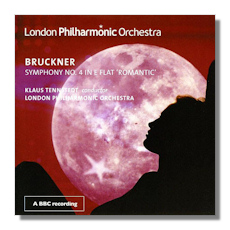
The Internet's Premier Classical Music Source
Related Links
- Bruckner Reviews
- Latest Reviews
- More Reviews
-
By Composer
-
Collections
DVD & Blu-ray
Books
Concert Reviews
Articles/Interviews
Software
Audio
Search Amazon
Recommended Links
Site News
 CD Review
CD Review
Anton Bruckner

Symphony #4 "Romantic"
London Philharmonic Orchestra/Klaus Tennstedt
London Philharmonic LPO-0014 71:01
Klaus Tennstedt recorded little Bruckner in the studio, but those efforts are well-regarded, especially by the English press. Tennstedt was a wonderfully modest and "spiritual" sort of conductor who did not regularly achieve results on disc worth preserving. His long and happy relationship with the London Philharmonic Orchestra reveals an ensemble willing to follow their leader without question, but almost never with ideal technical skills.
That said, Tennstedt live was almost always a better bet than Tennstedt in the studio. Generally speaking, the conductor demonstrates greater flexibility and vigor in his live performances, mostly captured on the London Philharmonic's in-house label. This was true of his Beethoven, his Mahler, and now his Bruckner. Despite less than infallible brass playing and some rather cavernous acoustics, there is much to admire here. Chiefly, there is real warmth and commitment. Whereas some conductors lose sight of musical structure when it comes to Bruckner, Tennstedt achieves a naturally flowing feel. There are some profoundly moving moments here, typical of the conductor, where the music sounds absolutely right. Those who prefer their Bruckner without drastic tempo adjustments will likewise appreciate the steady hand wielded on the podium. The London Philharmonic Orchestra certainly proves more energized here than in some of their less polished Beethoven on this label, and there is an appreciable sense of occasion.
Still, the brass flubs in the outer movements are noticeable enough to be problematic. Curiously, the section rallies for a heroic Scherzo. The strings are also aptly rich but a touch shy in the bass. This is a typical English deficiency, though the sounds we do get are mostly gorgeous. One wishes only that the maestro would have dug a little harder; it's the difference between being very good and unforgettable. Like the conductor's Mahler, commitment is less of a question than execution. On the other hand, the winds cut through the texture quite clearly, and this is a good thing. Here in 1989, the Philharmonic was prone to good days and bad – and by this point, Tennstedt rarely conducted at all – but this is a very fine concert. I imagine your response will largely depend on how you feel your Bruckner has to go. If you need tonal richness, Bohm/Vienna and Karajan/Berlin (EMI) are still the way to go. Should you want a deeply individual and spiritual experience, stick with either of Eugen Jochum's classic readings. But if you want to see what this erratic yet beloved artist could do live, this is a recommendable issue.
Copyright © 2015, Brian Wigman





















